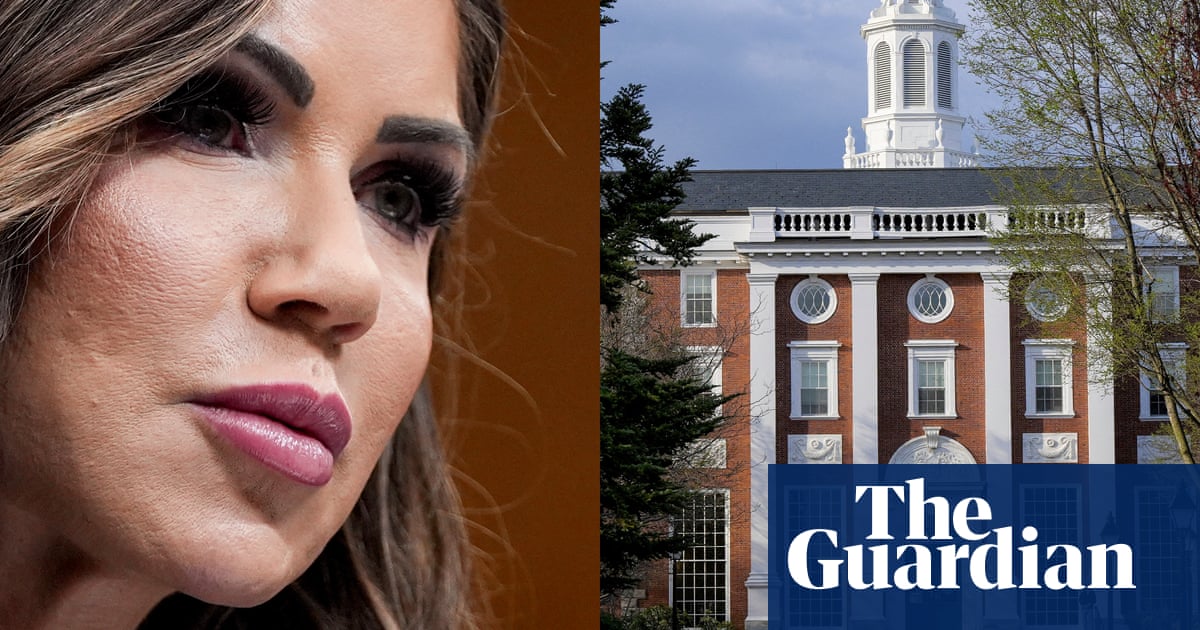TheTrump administrationhas said it is halting Harvard University’s ability to enroll international students and has ordered existing international students at the university to transfer or lose their legal status.
On Thursday, the New York Timesreportedthat the Trump administration notified Harvard about its decision following ongoing correspondence regarding the “legality of a sprawling records request”, according to three people familiar with the matter.
The records request comes as part of an investigation by the homeland security department in which federal officials arethreateningthe university’s international student admissions.
The homeland security secretary, Kristi Noem, posted a copy of the letter on X, formerly known as Twitter. In it Noem said: “I am writing to inform you that effective immediately, Harvard University’s Student and Exchange Visitor Program certification is revoked.”
“The revocation of your Student and Exchange Visitor Program certification means that Harvard is prohibited from having any aliens on F- or J-nonimmigrant status for the 2025-2026 academic school year. This decertification also means that existing aliens on F- or J- nonimmigrant status must transfer to another university in order to maintain their nonimmigrant status,” Noem continued.
Noem justified the decision by saying: “This action should not surprise you and is the unfortunate result of Harvard’s failure to comply with simple reporting requirements … Consequences must follow to send a clear signal to Harvard and all universities that want to enjoy the privilege of enrolling foreign students, that theTrump administrationwill enforce the law and root out the evils of anti-Americanism and antisemitism in society and campuses.”
The former governor of South Dakota alsoaccusedHarvard of “fostering violence, antisemitism and coordinating with the Chinese Communist party on its campus”.
In a separate press release, the homeland security department said: “Secretary Noem is following through on her promise to protect students and prohibit terrorist sympathizers from receiving benefits from the US government.”
A Harvard spokesperson called the government’s action “unlawful” in a statement to the Guardian on Thursday.
“We are fully committed to maintaining Harvard’s ability to host our international students and scholars, who hail from more than 140 countries and enrich the Uuniversity – and this nation – immeasurably,” the spokesperson said.
“We are working quickly to provide guidance and support to members of our community. This retaliatory action threatens serious harm to the Harvard community and our country, and undermines Harvard’s academic and research mission.”
The latest decision from the homeland security department comes amidgrowing tensionsbetween federal officials and Harvard over the Trump administration’s claims that the university has implemented inadequate responses to antisemitism on its campus.
The Trump administrationterminateda further $450m in grants to the university in May, following anearlier cancellationof $2.2bn in federal funding.
A Trump-appointed antisemitism taskforce haspointed to“just how radical Harvard has become” as nationwide anti-war protestors – including students – demonstrated against Israel’s deadly onslaught on Gaza, which has killed at least 53,000 Palestinians in the last year and a half.
The Trump administration has alsoorderedthe university to dismantle its diversity, equity and inclusion programming, restrict student protests, and disclose admission details to federal officials.
In response to the federal cuts, the university – with an endowment of more than $53bn – filed alawsuitagainst the Trump administration.
Harvard’s president, Alan Garber,saidin April that “no government – regardless of which party is in power – should dictate what private universities can teach, whom they can admit and hire, and which areas of study and inquiry they can pursue”.
Garber alsosaid: “The university will not surrender its independence or relinquish its constitutional rights … The administration’s prescription goes beyond the power of the federal government. It violates Harvard’s first amendment rights and exceeds the statutory limits of the government’s authority under Title VI. And it threatens our values as a private institution devoted to the pursuit, production and dissemination of knowledge.”
